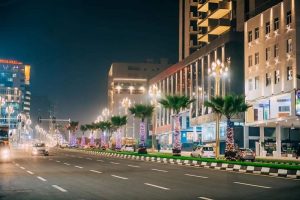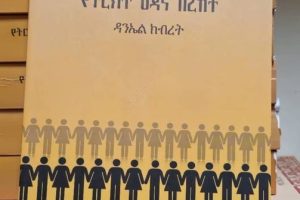
Mostly known for its luxurious facilities of the service sector, Bole is one of Addis Ababa’s large residences, with complex images of other parts of the city. It comprises the most luxurious hotels, apartments, and villas. It was mostly known as the best image of Addis Ababa, where westernized modern lifestyles and extravagant recreations took place. Meanwhile, it is also a place, where luxury hotels, nightclubs, and restaurants widely promote the rich, harmonious cultures of Ethiopia. Even though other parts of the city have many attractive, historical and cultural sites, tourists love to spend their nights around Bole.
Bole has also been a block, to some extent, with wider asphalt roads and better-looking public spaces in comparison with the old shanty places in the heart of Addis. However, it doesn’t mean that it would be left alone or that the city corridor development project would bypass this part of Addis Ababa. It is meant to be a VIP corridor, through which leaders, diplomats, and tourist’s first land at Bole International Airport and pass through.
In addition, it is the one place where many sections of the corridor development project start or, lead to or meet at some point. The construction of the corridor, which starts from the Bole International Airport area and goes through Megenagna and CMC, is going on at a remarkable pace and is reaching its completion, according to the Communication Office of the Bole Subcity. Bole Subcity Chief Executive (CEO) Alemtsehay Shiferaw says for its speedy progress, every worker in the project has his/her persistent contribution. Noting that the Corridor Development Project, which is being implemented on a 24/7 basis, will certainly ensure holistic prosperity for not only Addis Ababa but also for the whole Country.
She also says the ongoing corridor development project in the capital is set to significantly enhance the city’s green coverage, and once completed; the project will not only address the community’s infrastructural needs but also transform the city’s overall appearance. “This project will also play a crucial role in promoting culture and tourism, extending tourists’ days of stay,” she adds.
Dr. Efrem Gizaw is the coordinator of this particular corridor project. He says the corridor includes the construction of a wide asphalt road that can serve five vehicles in one lane at a time. He noted that this wide highway is expected to reduce traffic jams and enhance facilities for the grand shopping malls and hospitals that will be built on this corridor in the future.
He also said two underground passageways for pedestrians are being constructed. The idea of underpasses for pedestrians seems to be a new experience for Ethiopian cities.
Ifa Gemechu, a young college student who came from the Arsi Zone of Oromia, says he had been to Addis Ababa two years ago. And the difference in the faces of the city from now and then is unimaginable. He says the new beauty of the city created by the Corridor Development Project has taken him by surprise.
He also adds up about the emerging new working culture and new ways of construction in the underpasses. He says, “I remember there were pedestrian bridges around Art Kilo and on the road from Megenagna to the airport. I came from Arsi a week ago, and I passed by the asphalt road between Gerji Mebrat Hail and Haya Arat. When we passed by the main vehicle bridge, I looked for the pedestrian bridge that used to be next to it. There was no pedestrian bridge, and I asked people, where did it go? Then they told me the bridge was demolished and a new underpass was under construction.”
He also believes that this new idea of underground pedestrian passes is very artistic and will play a significant role in ensuring safe traffic movements and lessening pedestrian’s worries about crossing roads with moving vehicles in dangerous situations.
The prominent figure whose name is always mentioned whenever the corridor development project is discussed, Adanech Abiebie, Mayor of Addis Ababa, has recently spent time with a local television, touring and explaining the project in progress

The mayor walking down the stairs of a new on-going underpass construction around Arat Kilo says the underground pass way is approaching its completion. It is expected to have an elevator for disabled people and three entrances and exits. It will also have small coffee shops and other facilities. The maturity work is also expected to be completed in a week.
According to the mayor, shops that will promote the Nation’s cultural values, such as shops that sell traditional jewelry and handcrafts are planned to be open in the wide space of the underpass.
The Victory Monument above ground has also gained a brush of cladding renovation without losing its originality. It is also made to be surrounded by dancing fountains which gives it magnificence at night times. Explaining the significance of such renovation, Adanech says, “Citizens, the young generation in particular, will be more attracted to the memorial monument and will be inspired to ask and know deeply about their history”.
To realize such a thoughtful and artistic project an inclusive working culture is implemented. Most of all, a sense of ownership between every citizen is crucial. If someone loves his/her job, not how from the top or bottom level it is, the hard work will pay off positively. Adanech says “I am a person who loves my job. I think everyone knows that. Authority may come by chance or could be earned. Meanwhile, we are all equal creations of God, and we will pass away someday. No one is superior to the other. Thus, we all have to respect and love our jobs,” the mayor stresses.

On the other hand, explaining where the city found the budget to build such huge projects, Adanech says Addis Ababa’s income has grown highly in recent years. “In 2018, the city’s income was 30 billion birr. Now we are claiming about 230 billion this year. 140 billion Birr will be utilized for the development projects of the city in 2024. About 30 billion Birr is for the corridor development project, and we have paid six billion Birr in compensation for our residents.”
In this case, the mayor was openly grateful to the taxpayers of Addis Ababa. “Hadn’t you paid your taxes appropriately, it would have been difficult to realize the new face of our city.” She also notes that the development will bring more income to the city. It is warming up the economy even at its beginning. When it is through and every facility is open, it will result in more tourism and income. The more the city’s income grows, the more the life status of its residents improves, according to the mayor.
BY NAOL GIRMA
THE ETHIOPIAN HERALD WEDNESDAY 24 JULY 2024




